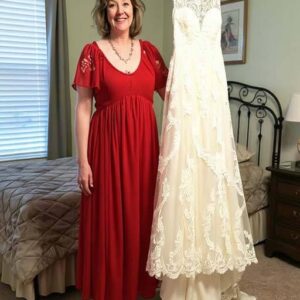I’ve been taking my therapy dog, Riley, on hospital visits for some time now. Most patients brighten instantly upon seeing him—touching his golden coat and smiling at his enthusiastic tail-wagging.
Today felt different, however. Nurses guided us into a hushed chamber where an elderly gentleman lay motionless, his gaze fixed upward. He appeared exhausted and withdrawn—as if conversation had eluded him recently. They introduced him as Mr. Callahan.
“He hasn’t been very responsive,” a nurse quietly informed me. “Perhaps Riley might make a difference.”
I agreed with a nod and signaled Riley. He immediately jumped onto the bed, placing his head carefully on Mr. Callahan’s chest. Nothing happened.
Then came a deep breath.
The man’s fingers stirred, barely moving initially, then gradually settling on Riley’s fur.
I waited anxiously. Then, with a hoarse, almost forgotten voice, he whispered, “Good boy.”
The nurse inhaled sharply. My eyes welled up.
His next words caught us all unprepared.
“Marigold…” The word emerged like a long-forgotten tune, delicate yet distinct.
“Marigold?” I echoed gently, uncertain if I’d heard correctly. Mr. Callahan turned slightly toward me, his hazy blue eyes flickering with a hint of awareness. “She would bring flowers to me every Sunday. Marigolds. Claimed they matched my hair in my youth.” A subtle smile crossed his face as he absently scratched behind Riley’s ears. “She always brought them, even after…” His words faded, leaving the thought unfinished, weighted with untold recollections.
The nurse beside me moved uneasily. She bent closer to whisper, “He hasn’t mentioned anyone specifically in months. Not since…” Her voice trailed off too, leaving her thought incomplete.
Riley cocked his head, detecting the atmosphere shift, and gave a gentle whimper. This seemed to return Mr. Callahan to the present moment. He lightly patted Riley’s side before looking at me again. “You remind me of her,” he stated unexpectedly, surprising us both. “The way you look at your dog. She connected with animals similarly.”
My throat constricted. Unsure how to answer, I simply offered a warm smile and asked, “Who was she?”
For the first time since our arrival, Mr. Callahan adjusted his posture slightly. His expression softened as if peering through years of memories. “Her name was Eleanor. We grew up in a tiny town nobody knows about. She was the only person who thought I could achieve something meaningful with my life.” He paused, his fingers idly stroking Riley’s fur. “We married straight after high school. Everyone thought we were foolish—young people limiting their futures—but it worked. For fifty years, it succeeded.”
His statement lingered in the room, rich with reminiscence and yearning. Yet there also existed an underlying grief, a darkness beneath his narrative. Something in his voice suggested this story wouldn’t conclude happily.
“What happened?” I asked softly, preparing myself for his answer.
His expression grew somber, and I briefly wondered if he would lapse back into quietness. Instead, he exhaled deeply, the burden of time weighing upon him. “Eleanor died two years ago. Cancer. Doctors claimed it was swift, but it didn’t seem that way to me. Observing someone you cherish diminish… it extends longer than expected.” He gulped, his hands shaking slightly. “Following her departure, everything seemed hollow. I ceased talking. Ceased eating. Ceased caring. Even the marigolds in our yard perished because I couldn’t motivate myself to water them anymore.”
A knot developed in my throat. I looked at the nurse, whose eyes sparkled with tears. This represented more than just a patient reconnecting with reality—it was a gentleman rediscovering aspects of himself he had interred alongside his spouse.
Riley apparently sensed the emotional shift because he pushed Mr. Callahan’s arm, drawing his focus back to the current moment. The elderly man laughed faintly, rubbing Riley’s neck. “You’re determined, aren’t you? Just as Eleanor used to be.”
That’s when realization struck me—the unexpected turn nobody anticipated. Perhaps it wasn’t mere chance that Riley had triggered this breakthrough. Dogs possess an ability to link people with their deepest feelings, spanning gaps we fail to notice exist. And possibly, just possibly, Riley’s presence wasn’t accidental.
As if perceiving my thoughts, Mr. Callahan continued, “You know, Eleanor always desired a dog, but we never had adequate room for one. She would have adored him.” He motioned toward Riley, who wagged his tail excitedly. “Perhaps she directed him to find me.”
The room became quiet except for the steady ticking of the wall clock. It wasn’t a religious declaration or a paranormal assertion—it was simply a man discovering solace in the concept that love endures beyond death. That somehow, somewhere, Eleanor continued to watch over him.
Before I could reply, Mr. Callahan astonished me again. “Can you escort me outside? I haven’t ventured out in weeks.” His tone carried a mixture of resolve and fragility, similar to a child requesting permission for something they desperately required.
I shared a look with the nurse, who nodded in approval. “Certainly,” I responded, assisting him to sit up completely. With Riley guiding us, we gradually proceeded to the hospital courtyard. The sun descended, coloring the sky with shades of orange and pink. Mr. Callahan absorbed everything, his eyes wide with amazement, as though viewing the world freshly.
When we reached a bench encircled by flower beds, he halted and indicated a cluster of bright yellow blossoms. “Marigolds,” he uttered softly, his voice breaking. “They planted marigolds here.”
Without further words, he sat down, bending forward to feel the petals. Tears flowed down his face, but they weren’t tears of grief—they were tears of appreciation, of recollection, of love rekindled.
As I settled Riley into his sleeping spot at home that night, I contemplated the day’s events. This went beyond Mr. Callahan merely speaking again; it concerned human bonds. It showed how even during our bleakest periods, a lifeline always exists to guide us back toward brightness—if we choose to grasp it.
Our lives contain numerous losses, significant and minor. At times, we lose individuals, aspirations, or segments of our identity. But recovery doesn’t require forgetting—it involves discovering fresh methods to keep those we’ve lost within us. Whether through remembrance, a blossom, or a furry friend, affection finds ways to reach us when we most require it.
If this tale moved you emotionally, consider sharing it with your friends and family. Let’s distribute some optimism and remind one another that even in quietness, opportunities to communicate always remain. ❤️




